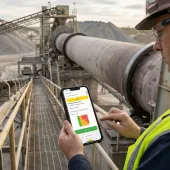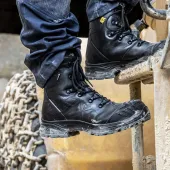Safety First! for the Bitumen Industry

First published in the July 2022 issue of Quarry Management as Safety First!
Why the bitumen industry must remain on health and safety high alert
By Martin McWilliam, HSEQ Manager, TotalEnergies UK
The health and safety of those working with bitumen products must be a top priority. Whether on the road network (by far the most common application – roads are often described as the arteries of a country, with almost 250,000 miles of them in the UK, equivalent to roughly 10 times the circumference of the Earth) or in other parts of the built environment, those tasked with working with and maintaining bitumen play a key role in the continued development and resilience of critical economic infrastructure.
As new technologies emerge and the industry continues to push the envelope in terms of product innovation, it is vital to ensure that best practice guidelines for storing, handling, and transporting bitumen keep pace.
One of the main hazards associated with bitumen use continues to be the elevated temperature of the product – up to 180°C. Work is currently under way to develop products that can be handled at lower temperatures, which, as well as reducing the risk of burns, injury, and damage to equipment, will have the added benefit of decreasing the release of harmful vapours and reducing the energy required to heat the product, resulting in lower CO2 emissions. Moreover, ongoing advances in safety devices and personal protective equipment (PPE) mean industry professionals can now handle bitumen with more control than ever before.
Raising awareness of key issues
Nonetheless, we should remain just as vigilant as ever: we must always strive for continuous improvement, educating and updating every worker about their health and safety obligations and the key principles of safe product handling, and enhancing safety culture across the board. There is an extremely wide range of health and safety issues that employers and workers should be aware of, and consequently there are also numerous best-practice processes on which professionals should be trained. These include knowing and understanding:
How to complete a Bitumen Discharge Permit
This is a critical ‘permit to work’ document which must be completed by both a plant operative and the delivery driver, and is required to confirm the authorization of deliveries, and verify that the grades and volumes of bitumen being delivered on to site are correct. It ensures that there is adequate ullage to receive the delivery to avoid tank overfills, mandates that all necessary pre-delivery checks are completed, and is designed to encourage all-important good communication between workers.
The importance of wearing PPE correctly
PPE is a vital layer of protection to prevent contact burns, however workers must be provided with the appropriate PPE for the operations being undertaken, and they must wear it correctly, such as wearing the legs of their high-visibility, fire-retardant coverall over the top of their safety boots.
Why having an emergency shower ready and fit for purpose matters
Should an accident occur, an emergency shower is a vital piece of equipment to help treat burns. It should be easy to use, have a sufficient flow rate and spray pattern to drench the whole body with clean water at the right temperature for a sustained period, and be always ready for use.
What the emergency shutdown procedure entails
In the event of an emergency, workers should be familiar with essential guidance for shutting down a bitumen delivery vehicle, including the location of the emergency stop buttons, what happens when they are pressed, and what to do if entering the 6m exclusion zone.
The many benefits of planned preventative maintenance
It is essential to conduct appropriate risk assessments and create an action plan of preventative maintenance (ie who, what, when, and how), giving due consideration to the nature and frequency of the intervention. This exercise should be carried out on all plants and processes to improve safety. Doing so can also decrease equipment downtime, reduce repairs, increase the life expectancy of assets, and reduce maintenance costs.
These issues, and many more – from how to deal with back pressure or the dos and don’ts when returning tanks to service, to specific first aid advice for treating bitumen burns and the risks of hydrogen sulphide – should be front of mind for operatives in the industry. Guidance on what the risks are and best practice on how to manage them needs to be up to date and accessible to all – plus, it needs to be simple to understand and follow. That is the rationale behind TotalEnergies’ ‘Work Well’ health and safety training portal, which was launched last year specifically to provide these resources to the bitumen industry.
Corporate and individual responsibility
Of course, this emphasis on easy access to straightforward information on health and safety risk management – and crucially, on having rules that are easy to follow on site – extends into the wider workplace too, whatever the industry sector. All employers have a corporate responsibility to communicate and embed best practices right across and all the way down through their organizations, and to regularly re-appraise rules both to accommodate industry changes and to ensure the message is being conveyed as effectively as possible. They also need to listen to operatives on the ground.
For example, research amongst 18,000 TotalEnergies employees and contractors across all business lines clearly indicates that for health and safety rules to be fully effective, workers need not only to be able to understand them in theory, but also how to implement them in practice. All too often, accidents can be caused through lack of knowledge or underestimating the risks and rushing to complete a task. Problems can be exacerbated by not knowing exactly what to do quickly and confidently, in stressful situations and under pressure.
Whether people are handling hot substances, working at height or in confined spaces, lifting, excavating, dealing with traffic, or a raft of other potential health and safety risks, the key to compliance is engendering a sense of personal commitment. It is this approach that now forms the basis of TotalEnergies’ ‘12 Golden Rules’ for safety at work, which were updated for World Day for Safety and Health at Work, and establishes a set of principles and controls across a multitude of activities and business areas.
For TotalEnergies, this has meant moving from a set of impersonal obligations and prohibitions (eg ‘Check that the absence of gas has been tested in a hazardous area’) to rules that are formulated in the first person singular (ie ‘I confirm that the absence of gas has been tested…’). By focusing on the actions to be taken by each individual to control risks in the workplace to prevent accidents, it is our experience that workers feel both more empowered and more responsible for their own safety and that of others.
From having the right permits for different jobs, to handling tools and equipment safely, securing dangerous sites, and keeping ‘out of the line of fire’, these rules cover the full range of potential work situations: both day-to-day safety, and the procedures behind non-routine or complex tasks.
In industries like ours, it is a major challenge to increase safety performance, to protect against serious risks in the workplace, and to achieve the goal of zero fatal accidents, but it is a daily challenge to which we must all rise.
Best-practice guidelines must be available to – and be able to be understood by – all, and while rules are essential, it is just as important to change mindsets and create a safety-first culture in which everyone knows they have an active part to play. Ensuring that every worker goes home safely at the end of every day should underpin all other activities: that is one fundamental golden rule to operate by, if ever there was one.
- Subscribe to Quarry Management, the monthly journal for the mineral products industry, to read articles before they appear on Agg-Net.com








